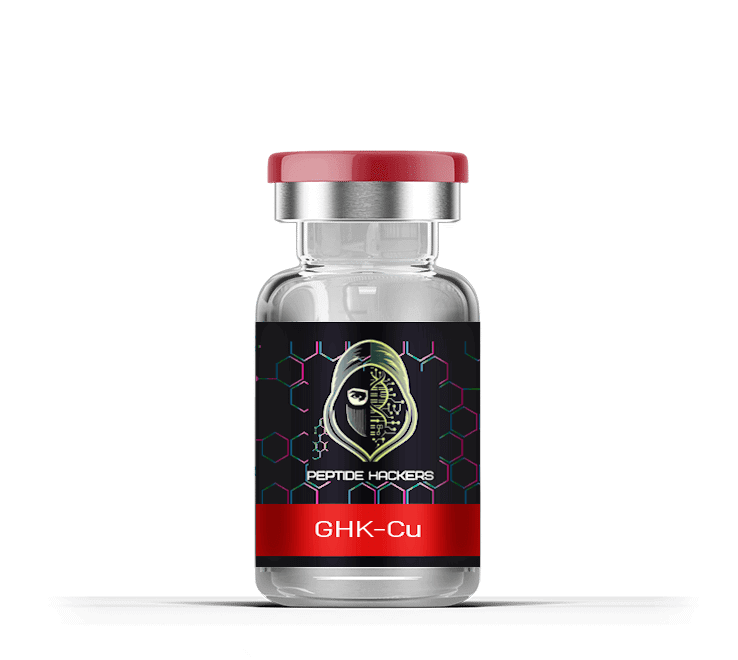Unleash the Power of GHK-Cu: Essential cooper Peptide for Advanced Research

Unleash the Power of GHK-Cu with Peptide Hackers
What Is GHK-Cu? A Must-Have for Your Research
So, you’re curious about GHK-Cu, right? This peptide might just be the unsung hero your lab has been missing. Before you get too excited about those tiny vials, let’s break down what GHK-Cu is all about.
The Chemical Breakdown of GHK-Cu
- Formula: C16H26CuN6O6
- CAS Number: 300801-03-0
- Nickname: GHK-Cu acetate, or Gly-His-Lys-Cu(II)
- Molecular Weight: 461.970
- Main Components: Carbon, Hydrogen, Copper, Nitrogen, and Oxygen
Details About the Vial
- Size: 3ml
- Contents: Lyophilized Powder with over 99% purity
- Chemical Name: [glycyl-κN-L-histidyl-κN,κN3-L-lysinato(2-)]-copper, monoacetate
Why GHK-Cu Should Matter to Your Research
Ready to take your research to the next level? GHK-Cu might just be the versatile tool you need. Think of it as the Swiss Army knife of peptides—capable of promoting healing, reducing inflammation, fighting oxidative stress, and more. It’s the multi-tasker every research lab could use.
The Science Behind GHK-Cu
GHK-Cu, or glycyl-L-histidyl-L-lysine-Cu2+, was discovered back in the 1970s by Dr. Loren Pickart. Since then, it has been celebrated for its ability to aid in skin repair, wound healing, and slowing down the aging process. If you’re delving into regenerative or anti-aging research, this peptide might just become your new best friend.
Why GHK-Cu is Essential for Your Lab
GHK-Cu for Accelerating Wound Healing
GHK-Cu can boost the production of collagen, elastin, and glycosaminoglycans—all of which are critical for skin repair. If your research focuses on tissue regeneration, this peptide could be the key to speeding up the healing process.
Anti-Inflammatory Effects of GHK-Cu
In addition to promoting healing, GHK-Cu has powerful anti-inflammatory properties. It’s an excellent candidate for studies looking into chronic inflammation and immune response regulation.
How GHK-Cu Enhances Collagen Production
GHK-Cu is well-known for its ability to stimulate collagen production, which helps maintain skin firmness and elasticity. This makes it an invaluable tool in cosmetic and dermatological research.
GHK-Cu as a Shield Against Oxidative Stress
Oxidative stress can be damaging to cells, but GHK-Cu acts as an antioxidant, protecting your cells from harm. This makes it particularly interesting for research on aging, chronic diseases, and environmental stressors.
Protecting Lung Tissue with GHK-Cu
Emerging studies suggest that GHK-Cu may help protect lung tissue from damage caused by oxidative stress, inflammation, and environmental toxins. This could be significant for respiratory research, particularly in studying conditions like COPD or acute lung injury.
GHK-Cu: A Peptide with Broad Potential
While GHK-Cu is often used in skincare for its anti-aging benefits, its potential applications extend far beyond that. From influencing gene expression to being studied in cancer research, GHK-Cu is a peptide with wide-ranging possibilities.
Using GHK-Cu Responsibly in Research
Quick Tip: When purchasing GHK-Cu from Peptide Hackers, remember it’s intended strictly for research. It’s not for personal use, so keep it out of your skincare routine and your kitchen. It belongs in the lab.
Guidelines for Safe Handling of GHK-Cu
- No Human or Animal Testing: It’s illegal and unsafe to use GHK-Cu outside of controlled research settings.
- Proper Handling Required: This compound should only be handled by qualified professionals who follow strict safety protocols.
- Not for Consumer Use: GHK-Cu is not a skincare product, dietary supplement, or medication. It’s a research chemical, not something for home use.
- Legal Disclaimer: We’re providing this information for research and educational purposes only. Misuse of GHK-Cu is not our responsibility.
The Final Word on GHK-Cu for Research
If your research could benefit from a powerful, multi-functional peptide, GHK-Cu might be exactly what you need. Just make sure to keep its use strictly within the lab, handle it responsibly, and avoid any misuse. Happy experimenting!


